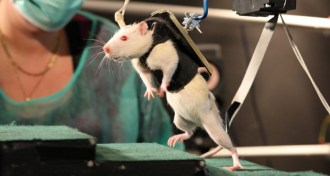Humans
Sign up for our newsletter
We summarize the week's scientific breakthroughs every Thursday.
-
 Health & Medicine
Health & MedicineFish oil components may not benefit everyone’s heart
A six-year study finds that omega-3 fatty acids don't lower heart risk in people with diabetes.
By Nathan Seppa -

-
 Tech
TechCourt ‘shares’ researchers’ e-mails, intellectual property
“A situation has arisen involving scientists at the Woods Hole Oceanographic Institution (WHOI) that should concern all those who value the principles of academic freedom and responsibility,” warns top WHOI officials. They were responding to a court order requiring that two WHOI scientists turn over 3,500 emails and other documents to BP. Included in the information was intellectual property that outsiders could exploit.
By Janet Raloff -
 Health & Medicine
Health & MedicineReplacing fatty acids may fight MS
Patients are deficient in four key lipids that neutralize immune cells linked to inflammation and nerve damage.
By Nathan Seppa -
 Health & Medicine
Health & MedicineWhy antipsychotics need time to kick in
Insight into how some schizophrenia drugs work may explain why compounds that build up in the brain can take weeks to provide relief.
-
 Humans
HumansStone Age art gets animated
Cave paintings and decorated disks provided moving experiences in ancient Europe.
By Bruce Bower -

-
 Life
LifeTreatment helps paralyzed rats walk
A combination of drugs, electrical stimulation and therapy can restore lost connections between lower limbs and brain.
-
 Humans
HumansDepolarizing climate science
A study out this week attempts to probe why attitudes on climate risks by some segments of the public don’t track the science all that well. Along the way, it basically debunks one simplistic assumption: that climate skeptics, for want of a better term, just don’t understand the data — or perhaps even science. “I think this is sort of a weird, exceptional situation,” says decision scientist Dan Kahan of the Yale Law School, who led the new study. “Most science issues aren’t like this.” But a view is emerging, some scientists argue, that people tend to be unusually judgmental of facts or interpretations in science fields that threaten the status quo — or the prevailing attitudes of their cultural group, however that might be defined. And climate science is a poster child for these fields.
By Janet Raloff -
 Chemistry
ChemistryYoungsters can sniff out old people’s scent
Body odor changes detectably with age, becoming mellower in men and not at all offensive in either sex — even to young people.
-
 Health & Medicine
Health & MedicineFever in pregnancy linked to autism
Pregnant women who run a high temperature that goes untreated may double their risk of having an autistic child, a study finds.
By Nathan Seppa -
 Humans
HumansClimate skepticism not rooted in science illiteracy
Cultural values are more important than science knowledge in shaping a person’s views on global warming.
By Janet Raloff